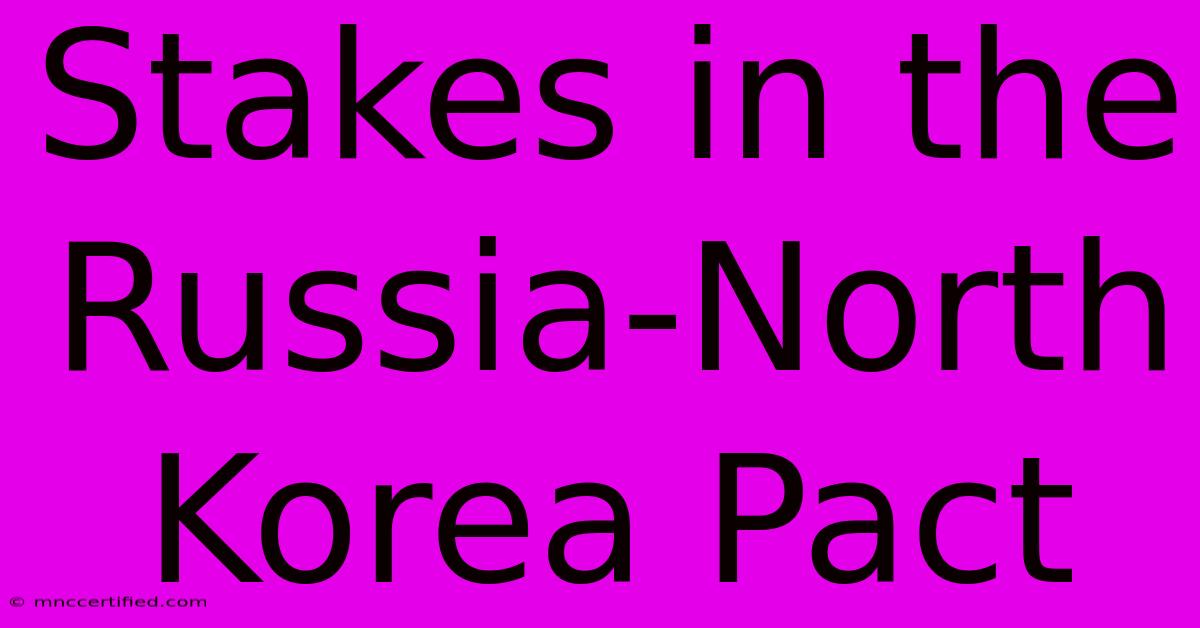Stakes In The Russia-North Korea Pact

Table of Contents
Stakes in the Russia-North Korea Pact: A Deep Dive into Geopolitical Ramifications
The burgeoning relationship between Russia and North Korea presents a complex and evolving geopolitical landscape, raising significant stakes for multiple actors on the world stage. This alliance, fueled by mutual interests and shared grievances with the West, has profound implications for regional stability, international security, and the global balance of power. Understanding the intricacies of this pact is crucial to navigating the evolving dynamics of the 21st century.
Military Cooperation: A Key Pillar
One of the most significant stakes in the Russia-North Korea pact lies in the realm of military cooperation. Russia's interest in North Korean weaponry, particularly artillery shells and missiles, is well-documented. Facing sanctions and depleted munitions reserves following its invasion of Ukraine, Russia seeks to replenish its stocks. North Korea, meanwhile, stands to gain economically through arms sales and potentially access to advanced Russian technology.
This military collaboration poses a direct threat to regional stability, especially in Northeast Asia. The increased flow of weapons to North Korea could embolden its aggressive actions, while Russia's acquisition of North Korean arms could escalate tensions with neighboring countries and potentially NATO allies. The potential for miscalculation and accidental conflict increases significantly with this deepening military partnership.
Beyond Weapons: Intelligence Sharing and Training
The stakes extend beyond mere arms transactions. Intelligence sharing is another critical component. North Korea’s extensive surveillance network and Russia's intelligence capabilities create a formidable combination. This could lead to enhanced espionage activities against Western interests, further destabilizing the global order. Additionally, joint military training exercises are another possibility, enhancing interoperability and further amplifying the threat potential.
Economic Implications: A Symbiotic Relationship?
The economic stakes are equally significant. North Korea's struggling economy could benefit from Russian aid and trade opportunities. This infusion of resources could bolster the North Korean regime's survival and its ability to pursue its nuclear and missile programs. For Russia, access to North Korean resources, particularly minerals and labor, could mitigate the impact of Western sanctions.
However, this economic interdependence is a double-edged sword. The potential for economic sanctions against Russia to extend to North Korea, and vice-versa, presents a substantial risk. The economic benefits might be limited by the existing international sanctions regimes against both countries. Any significant economic growth stemming from this partnership could be precarious and unsustainable.
Circumventing Sanctions: A Risky Game
The two nations are actively seeking ways to circumvent international sanctions. This could involve using third-party countries as intermediaries for trade and arms transfers, creating a complex web of transactions difficult to monitor and regulate. This effort to sidestep sanctions increases the risk of confrontation with international organizations and further isolates both nations on the global stage.
Geopolitical Repercussions: Shifting Global Dynamics
The Russia-North Korea pact has far-reaching geopolitical repercussions. It signals a growing alignment against the West, potentially strengthening the axis of authoritarian states. This could lead to increased global instability and a more fragmented international order.
The partnership challenges the existing global security architecture and potentially weakens international norms against proliferation of weapons of mass destruction. The increased assertiveness of both nations, emboldened by their partnership, could provoke more aggressive actions against their perceived adversaries, leading to further regional conflicts.
Impact on US-China Relations
The alliance also impacts the complex relationship between the US and China. While China is not directly involved in the pact, it may be forced to navigate the shifting regional dynamics created by this alliance. The increased military activity in the region could strain US-China relations, adding another layer of complexity to the already tense geopolitical environment.
Conclusion: Navigating the Uncertain Future
The stakes in the Russia-North Korea pact are high. The implications for regional stability, global security, and international relations are profound. Understanding the intricacies of this evolving partnership is essential for policymakers, analysts, and the international community as a whole. This alliance presents a major challenge to the existing world order, requiring careful monitoring and proactive strategies to mitigate its potential negative consequences. The future of Northeast Asia, and indeed global security, hangs in the balance.

Thank you for visiting our website wich cover about Stakes In The Russia-North Korea Pact. We hope the information provided has been useful to you. Feel free to contact us if you have any questions or need further assistance. See you next time and dont miss to bookmark.
Featured Posts
-
Dune Prophecy Episode Drop Dates
Nov 19, 2024
-
Post Jones Benching Giants Outlook
Nov 19, 2024
-
E Coli In Carrots Urgent Nationwide Recall
Nov 19, 2024
-
Kremlin Issues Warning To Us On Ukraine
Nov 19, 2024
-
One Tree Hill Actor Paul Teal Dies At 35
Nov 19, 2024